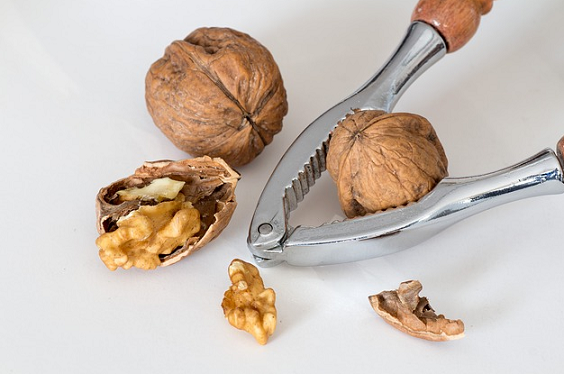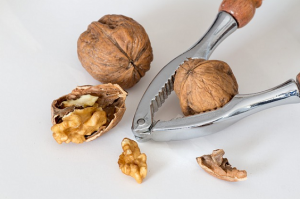Can dogs eat walnuts? Here is a question that has been asked by a great number of people. Why would dog owners want to give walnuts to their dogs? We love our dogs and every time they do something good, they should be rewarded. By constantly rewarding your dog, he will learn to associate the action classified as being good to the fact that he is receiving your undivided attention and a great treat too.
By giving him treats, you will be able to create a pattern and make your dog more docile. But what treats could you give him? Usually, pet stores will sell treats that are especially designed for your dog, loaded with many vitamins and nutrients. However, you may not always have these around. Your dog could be doing something good and your dog treat container might be empty. What treat could you give him in this particular situation?
You will certainly have some nuts around the house, which we know are great for humans, but are they that great for dogs? Let’s take walnuts, for instance. We enjoy them as snacks between meals. They keep us full, not to mention that they are really healthy too.
However, we cannot help but wonder if these tasty nuts are safe for our dogs as well.
Can Dogs Eat Walnuts?
Walnuts are not recommended for dogs.
Here is what specialists think about dogs eating nuts, walnuts in particular. According to dr. Ashely Hughes from the Friendship Hospital for Animals in Washington, DC, walnuts are okay for dogs to eat if they happen to eat one that has fallen off your kitchen counter. However, if you give your dog walnuts as treats, they have the same effect as chocolate does. And we all know that dogs should not eat chocolate at all.
Walnuts are vulnerable to grow a certain type of black mold that can be extremely toxic to dogs. This is not likely to occur in good quality walnuts you buy at the super market. However, examine the walnuts if you’ve been keeping them for a long period of time or if you collect them from your own trees or from the wild. Symptoms of black mold poisoning are vomiting, shaking and even death if not promptly treated.
Other symptoms of nut poisoning include loss of appetite, blackened stools, vomiting, lethargy, and liver failure.
Black walnuts have their origins in Canada and in Northeastern US. These are extremely toxic for your dog. However, they seem to not affect cats at all. Also, if you happen to have a walnut tree around or even in your backyard, you should not allow your dog to get into that region. Why? Because of the fact that he might be tempted to eat old walnuts that have been laying on the ground for some time. These walnuts get moldy in time and contain penitrem A. If your dog ingests these nuts, he may develop seizures and tremors caused by these 2 extremely dangerous ingredients.
Just to be in the safe side, experts recommend keeping your dog away from all nuts because they can cause toxic poisoning to your beloved pet. Some nuts can cause gastrointestinal obstruction. Walnuts are larger than many other nuts and dogs don’t chew their food as thoroughly as humans do, so larger nuts, like walnuts, are more difficult to digest. Unprocessed, bigger nuts can obstruct a dog’s bowel movements. However, poisoning is the worst for dog’s health. The costs that are involved for treating this condition are somewhere above $400. Walnut poisoning is actually one of the most common claims for toxic ingestion that have ever been reported.
Nuts in general have a high fat content and can still cause an upset stomach even if they are not toxic. Also, keep in mind that the size of your dog has an impact on how poisonous walnuts can be. A small dog eating a bunch of walnuts is at higher risk than a large dog eating the same amount.
More Info on Black Walnuts
This type of nut will contain a toxin named juglone, which is known to cause vascular diseases in horses. However, when it comes to dogs, ingesting black walnuts will cause gastrointestinal problems and sometimes even the obstruction of the bowels.
If they are moldy too, they will be triggering seizures and neurological symptoms due to the fact that walnuts contain tremorgenic mycotoxins (toxic chemical products produced by fungi). So, as you can see, you should keep your dog away from black walnuts.
English Walnuts and Their Effects
These walnuts are most likely to cause obstruction and stomach aches. If they are moldy too, they will contain the same mycotoxins that have been mentioned previously, which basically have the same effects on your dog’s body. Thus, English walnuts are as harmful as black walnuts.
Can Dogs Eat Japanese Walnuts?
Japanese walnuts are non-toxic. However, if they are moldy when found in the wild, they may cause the same symptoms as the above mentioned walnuts.
Concurrently, being similar in shape and size to the other walnuts, they may become an intestinal blockage.
Conclusion
After reading this article, it should be clear that dogs should not eat any walnuts. Walnuts are not recommended even as occasional treats. However, if your dog will find one and eats it, he should be fine. Just observe his behavior closely for couple of hours. Usually, one walnut will not cause any damage.
Related articles:
References:
http://www.pet360.com/dog/health/can-dogs-eat-walnuts/k7P5znB6dUa5-0N0Z9SQnw
http://pets.thenest.com/nuts-deadly-dogs-10365.html
http://www.dogster.com/dog-health-care/
http://www.candogseat-this.com/can-dogs-eat-walnuts-article/









Leave a Comment